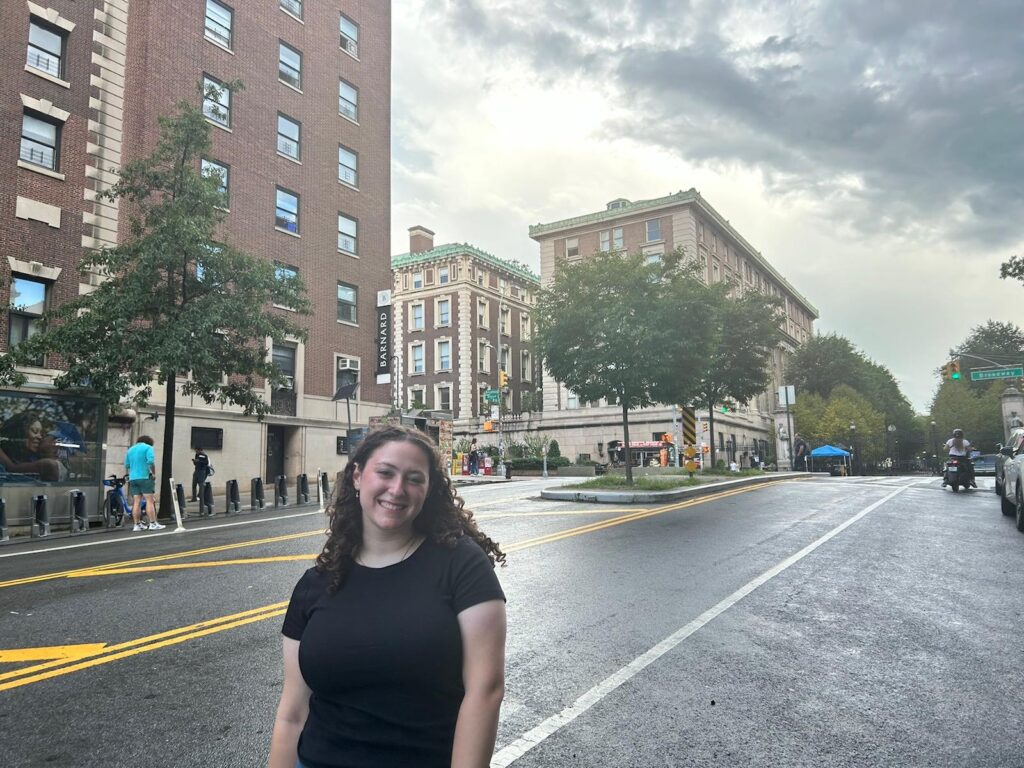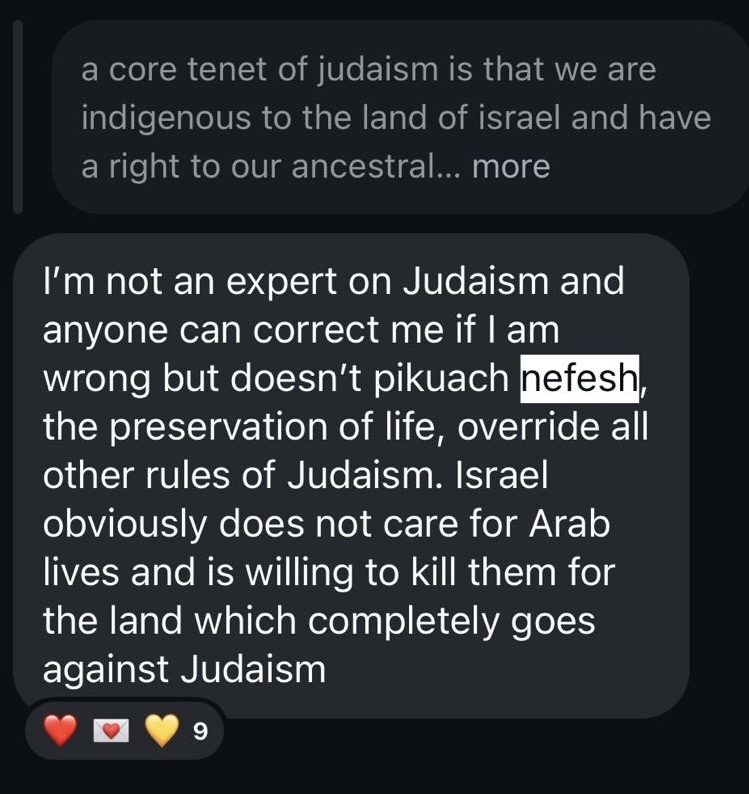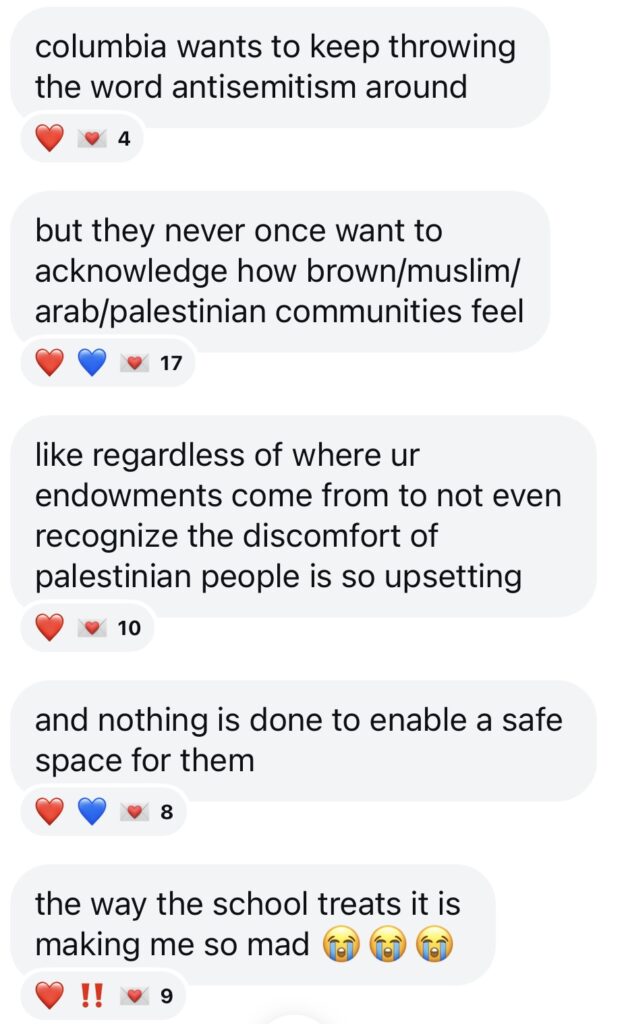
My name is Eliana Birman. I am a proud Jew and Zionist, and this week, I moved into my dorm at Barnard College of Columbia University. I’m heading into the belly of the beast.
Barnard has always felt like the perfect fit for me. The “girls supporting girls” mentality, combined with the school’s rigorous work ethic and proximity to both New York City and my home in Teaneck, made it my top choice. I applied for an early decision and committed to Barnard in December 2022.

This past year, I took a gap year in Israel at Midreshet Amudim, experiencing October 7 firsthand from Jerusalem. Even without this experience, I would have supported Israel’s actions in this war, but I felt even more passionate about it after experiencing all that war meant in Israel and using my time to volunteer with people largely impacted by it.
In December 2023, Barnard announced its first wave of early decision admits for the class of 2028. Excited to connect with my future classmates, I followed many of them on Instagram, hoping to forge friendships before arriving on campus. Initially, the interactions were friendly.
But soon, I noticed a disturbing trend: blatant calls for the delegitimization or even destruction of my ancestral homeland. These posts were intolerable, so I unfollowed those students but we remained connected through the “Barnard ’28” Instagram group chat.
In April 2024, everything exploded. While I was enjoying my bein hazmanim (Pesach break) from seminary, Columbia University became the subject of countless global headlines. Columbia was the first university to create an encampment in response to the Israel-Palestine conflict, and with no precedent, chaos ensued. (For a thorough timeline of Columbia protests, visit https://tinyurl.com/2vavk9my).
The Columbia and Barnard Instagram group chats became cesspools of support for the encampment and antisemitic rhetoric. Messages were sent stating, “I don’t think Jewish students are being targeted, I think they are just uncomfortable with pro-Palestinian ideas and are saying it’s antisemitism,” and “There’s a certain leverage that Jewish people hold within large corporations because they’re one of the wealthiest demographics in the country.” One member began ranting about her “crazy AP lit teacher” who said, “Hopefully these riots end so you don’t have to deal with it.” The student followed up by saying “Dude … I’ll be in those protests, what are you on about?” Many in the group chat laughed and labeled the teacher insane for speaking against the protests.
One student shared a link to another Instagram group chat for Barnard class of ’28 students interested in joining the protests and pressuring Columbia to divest from Israel. As others asked to be added to the group, the admin gleefully replied, “Yasss, love seeing people who aren’t complicit in genocide.”

Since April 17, violent and repugnant videos and images have come out across social media from the Columbia encampment, entitled the “Liberated Zone.” Despite arrests, suspensions and threats that the National Guard would shut down the encampment, it seemed to thrive. Encampment leaders like Khymani James proudly stated that “Zionists don’t deserve to live.” University property was destroyed and staff were barricaded inside Hamilton Hall, which protesters overtook on April 30.
I watched all this from Jerusalem, feeling a profound sense of disillusionment. How could the world be so twisted that an active war zone felt safer than the college campus of my dreams? I spoke to my parents, my future roommate and my friends about what my life would look like if I attended this school. I didn’t want to compromise my education or belittle the achievement that was being accepted to an Ivy League school, but I didn’t want to live in fear either. In the end, I decided to give it at least one semester, hoping the chaos would die down over the summer. Now, nearly a year into the war, it seems the protests are not slowing down anytime soon.
In one particular debate on the “Barnard ’28” Instagram chat, I wrote that anti-Zionism, in a practical sense, is antisemitism because the belief that the Jewish people are indigenous to Israel and that it is our ancestral homeland is a core tenet of our faith. In response, one member—who I don’t believe is Jewish at all—wrote, “I’m not an expert on Judaism and anyone can correct me if I’m wrong, but doesn’t pikuach nefesh, the preservation of life, override all other rules of Judaism? Israel obviously does not care for Arab lives and is willing to kill them for the land, which completely goes against Judaism.” Nine members liked her message.

In response, Shoshana Aufzien, an incoming dual degree student at Barnard/JTS, shared with me, “The same purportedly ‘woke’ and ‘socially conscious’ individuals who post incessantly about the perils of cultural appropriation and the importance of safeguarding religious freedoms misconstrue Jewish values to serve partisan agendas and propagate antisemitic libels with impunity.”
Recently, I discovered an Instagram account called “barfnard” (a play on Barnard), where four Barnard students post content calling for “the downfall of the Zionist entity” and more. Despite reporting the account to Instagram and the school’s Hillel, it still stands. A recent post on the account stated, “MINOUCHE DOWN, ZIONISM NEXT!” (referring to Columbia President Minouche Shafik, who recently resigned due to the school’s handling of the protests). Disturbingly, these students represent a significant portion of the Barnard student body.

Despite everything, I’m still committed to attending Barnard this fall. However, I know I must prepare myself for what lies ahead—constant protests, wary glances at my Magen David necklace, and potentially hostile remarks from professors and students alike. I worry that putting a mezuzah on my door might make me a target. One of the reasons I chose to attend a secular college was to build friendships and gain insight from people of different backgrounds, not just Modern Orthodox Jews like myself. Now, I’m afraid to branch out, afraid to admit that I am Jewish or a Zionist, fearing that people will dislike—or even hate—me because of it.
I refuse to hide my identity or my beliefs. I am proud of who I am and what I stand for. But I am also afraid—afraid for my mental and physical safety and for my well-being. I can’t express my beliefs without expecting consequences.
Eliana Birman is the assistant digital editor for The Jewish Link. She is beginning her studies at Barnard College this fall and lives in Teaneck.








